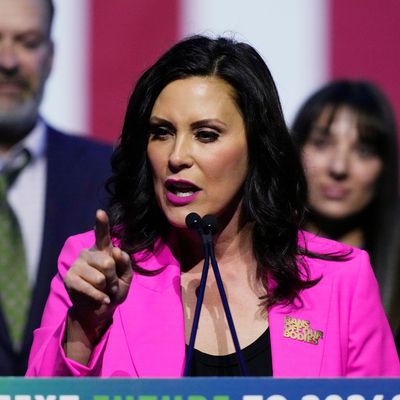
As Donald Trump’s 2024 announcement signaled, we are now officially in the run-up to the next presidential election. But there’s a big missing piece of basic election infrastructure, at least for Democrats: The order of states holding presidential primaries is very much up in the air.
Earlier this year, the Democratic National Committee’s Rules and Bylaws Committee, which sets guidelines for the nomination process and administers sticks and carrots to get states to comply, announced it would authorize five “early states” allowed to have nominating contests prior to March 1, 2024. The four states that were allowed across this golden rope line from 2008 through 2020 — Iowa, New Hampshire, Nevada, and South Carolina — would have to reapply for privileged status along with everyone else. As many as 20 state Democratic parties expressed interest in vying for these five spots. But because some of the changed calendar positions would require action by the state government, which typically control and finance primaries, the DNC delayed a final selection until after the midterms sorted out who ruled where.
Now Michigan Democrats, who flipped both legislative chambers and hung on to the governorship this month, are galvanizing the 2024 calendar discussion with a clear bid for an early spot, as NBC News reports:
Michigan Democrats — led by Rep. Debbie Dingell — feel well positioned to join the coveted ranks of the early states, after they made huge gains in the Nov. 8 election. With Iowa facing possible eviction from the early states, many expect Democrats to elevate a Midwest state.
Democrats now have full control of the Statehouse in Lansing, which would allow them to easily change state laws to support a new date for the 2024 primary.
The DNC’s previously announced criteria for early states, as reported by CBS News, were diversity (racial, ethnic, geographic, and economic diversity as well as union representation), general-election competitiveness, and feasibility (whether states can move their contest into the early window, if they can run a “fair, transparent and inclusive nominating process,” and the logistical requirements and cost of campaigning in that state). It was an unstated but understood criterion as well that the five early states would represent different regions. So Michigan may be competing for an early-state slot with Minnesota, where Democrats also nailed down a trifecta in the midterms.
Iowa’s traditional first-in-the-nation caucus has looked doomed all along. The state is famously nondiverse and is now solidly Republican in general elections. The “feasibility” of an Iowa event was also called into question by the 2020 fiasco, in which no Iowa caucus results were announced until the next day.
New Hampshire will be harder to dislodge, despite its nondiverse population, because of a state law that authorizes the secretary of state to move the primary date around in order to maintain the position of first primary. But Nevada Democrats are making a sustained effort to leap ahead of New Hampshire by switching to a primary and aggressively advertising their superior diversity and obvious competitiveness. It’s unclear, however, whether Republican Joe Lombardo’s gubernatorial win in Nevada will disrupt efforts to authorize a new state primary.
That points to one of two variables complicating the early-state selection process: By and large, Republicans are happy with the existing order of states. There is no pressure within the GOP to dump Iowa or displace New Hampshire or do anything else unusual. So in states where Republican cooperation is necessary to move things around or make the requisite resources available, Democrats have to convince their partisan enemies to care about it as well. And if the proposed new primary date in any given state violates the RNC’s existing calendar rules, that state’s Republicans could be penalized and lose delegates to their own convention. The prospect of a serious battle for the GOP presidential nomination adds another series of calculations.
It’s a Rubik’s Cube, and that’s largely why the existing calendar for both parties has stayed in place for so long aside from the fact that, in Iowa and New Hampshire, both parties have long cooperated to defend their calendar privileges like crazed badgers.
The other big variable facing Democrats is the broader context: What sort of decisions will Democrats be facing in 2024? At this point, we don’t know for sure whether President Biden is running for a second term, and we don’t know if he’ll face major competition if he does. If Biden has to fight for renomination, how he performed in particular states in 2020 may have some influence on a loyal DNC deciding where he has to run in 2024. That might really doom Iowa, if it’s not already doomed, given Biden’s fourth-place finish there in 2020. And Biden finished fifth in New Hampshire. The DNC likely wouldn’t want to give calendar privileges to the home state of a potential rival.
But decisions have to be made, and the Rules and Bylaws Committee is set to make them when it meets from December 1 through 3 in Washington, D.C. Much fur may fly.
More on politics
- Trump Ambassador Picks: Who’s in His ‘Diplomatic Clown Car’
- What We Learned From the House Ethics Report on Matt Gaetz
- Everyone Biden Has Granted Presidential Pardons and Commutations






























